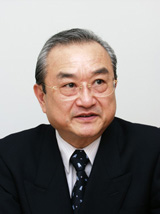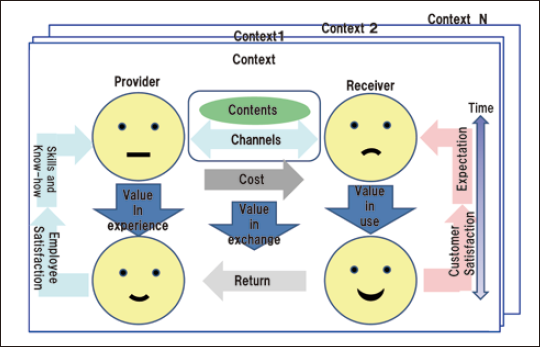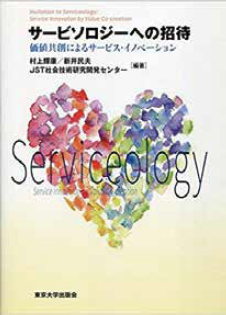We developed (improve quality/efficiency and augment new values) problem-solving technology/methodology, etc. with an interdisciplinary (natural science and cultural/social science, etc.) approach by grasping society’s specific or latent needs and utilizing real data or case examples as well as, furthermore, promoting research and development for establishing a research foundation for “service science”. (Activities ended in March 2017)
Program Supervisor

DOI Norihisa
Professor Emeritus, Keio University(as of the completion of the Program)
Approximately 70-80% of the entire industrial composition is said to relate to the service sector nowadays. Although efficiencies are indeed important, if we put too much emphasis on them, services can become de-humanized and one might forget the people for whom these services are intended in the first place. Under our program, we always keep in mind that recipients of services are human beings (clients). We take raw data in to examine a phenomenon from various perspectives, combining natural, cultural and social sciences for analysis. What is the definition of service? What can be done to make a service better? Through our Program, we will pursue the answers to these questions.
Outline
1. Service Science, Solutions and Foundation Integrated Research Program
"Service Science Solutions and Foundation Integrated Research Program" is one that identifies the specific and latent needs of society and uses actual data and case studies to develop technologies, methodologies etc. for solving problems based on a multidisciplinary approach, as well as pursuing research designed to establish "Service Science" research infrastructure.
2. The Approach to "Services" and "Service Science"
The role of services is to produce social and economic value. There are many different types of services, ranging from financial, retail and information services, to environment and energy, administration, social welfare and medical care, and other public services. In Japan, services were once considered to be something added on to products, or commoditized in the service industry as opposed to the manufacturing industry.
However, the value created by services does not consist only of that produced through the exchange of services for currency (exchange value); it also includes the value produced through the use of objects and services (utility value). In recent years, the view that services (the service industry) and products (the manufacturing industry) are inseparable is becoming prevalent worldwide. One of the differences between "Service Science" as used in this Program and the conventional scientific and service-related research is the introduction of a scientific approach to existing services in an effort to make them more efficient and optimal. Another difference is the approach to the various services in society that includes both service providers and beneficiaries. This will produce scientific knowledge regarding concepts, theories, technologies and methodologies that will be used to establish a new academic foundation, as well as improving existing value and creating new value.
Here "science" includes the natural sciences such as mathematics and information and communications engineering and so on as well as the humanities and social sciences such as management, marketing, and cultural anthropology. Based on the above description, "Service Science" will be defined in this Program as "academic activities for the establishment of service-related scientific concepts, theories, technologies and methodologies and the use of the results from these activities."
Goals
- Develop technologies, methodologies etc. that are effective in solving problems
- Establish a research foundation for "Service Science"
- Contribute to society through the use of the results of the research in various services to resolve specific problems
- Help create a community of "Service Science" researchers and practitioners (activists) for implementation
Two Research Approaches: A) Solution-oriented "Service Science" Research and B) Foundation-oriented "Service Science" Research
In order to achieve the above objectives, two approaches to research have been established:
A) Solution-oriented "Service Science" Research, in which the research starts with the resolution of specific service-related problems
B) Foundation-oriented "Service Science" Research, in which the research starts with the "Service Science" research element
The solutions from research approach A and the creation of scientific concepts, theories, technologies and methodologies created by research approach B are expected to complement one another, resulting in the generalization and systematization of "Service Science" research elements and helping to create a research foundation for "Service Science".
R&D Projects
 In this program, we addressed, since its inauguration in 2010, establishment of a research and development foundation for service science and creation of methodology/technology for solving various programs relating to service. As a result, service supply utilizing the research outcomes was achieved or systematic theoretical research outcomes, etc. were created. We also presented the “Service Value Co-Creation Framework (named the Smile Chart)”, which is a common framework for understanding the positioning of service science research.
In this program, we addressed, since its inauguration in 2010, establishment of a research and development foundation for service science and creation of methodology/technology for solving various programs relating to service. As a result, service supply utilizing the research outcomes was achieved or systematic theoretical research outcomes, etc. were created. We also presented the “Service Value Co-Creation Framework (named the Smile Chart)”, which is a common framework for understanding the positioning of service science research.
Additionally, participants in this program were stakeholders in founding the Academic Society of Services.
While promoting these activities, the social situation relating to services changed largely; it has come to be expected that, in the future, a “Super Smart Society” will emerge, in which creation of services to supply new values utilizing ICT is accelerated. Under such circumstances, to review what research and development is necessary for creating new services, the “Service Science’s Future Review Meeting”, which consists of young service researchers and designers, etc., was set up under this program; after over 1 year of investigations and discussions, the review results were summarized in a report “Aiming at a Service Science to Co-Create the Future” (October 2015). In FY2016, based on the report above, an open call for proposals for possibility surveys on research and development program schemes to address creation of new services and establishment of service design methodology was launched and 8 projects were adopted.
In March 2017, a workshop to report the results of these possibility surveys as well was held to brush up the proposals for deployment of the schemes.
 A book that summarizes mainly the research outputs of this program “Invitation to Serviceology: Service Innovation by Value Co-Creation” was published in June 2017. The projects promoted under this program, from the background to/how and why of the birth of “serviceology” to aim at realizing innovations by a comprehensive and scientific approach to services to social implementation and up to future prospects, are introduced, intertwining the newest case examples of research. The content will attract not only beginners in, or researchers of, services, but also corporate directors and planners as well as business managers.
A book that summarizes mainly the research outputs of this program “Invitation to Serviceology: Service Innovation by Value Co-Creation” was published in June 2017. The projects promoted under this program, from the background to/how and why of the birth of “serviceology” to aim at realizing innovations by a comprehensive and scientific approach to services to social implementation and up to future prospects, are introduced, intertwining the newest case examples of research. The content will attract not only beginners in, or researchers of, services, but also corporate directors and planners as well as business managers.
Edited and authorized by: MURAKAMI Teruyasu / ARAI Tamio / JST Research Institute of Science and Technology for Society
University of Tokyo PressPrice (3900 yen + tax)P ublished on June 21, 2017
FY2013
A
|
Empirical Research on Co-creative Skill E-learning Service with Visualization of Experience Value |
2013.10-2016.9 |
|---|---|
|
Construction of foundation for smart social service systems, creating secure and safe community through the advancement of emergency medical care |
2013.10-2014.3 |
B
|
A method for value co-creation in higher education by enhancing provider's competency and receiver's literacy |
2013.10-2016.9 |
|---|---|
|
Service System Categorization based on Value Creation Models and Design Theory of Service Mechanism |
2013.10-2016.9 |
FY2012
A
|
Development of Adaptive Service Model with Co-creative Design under Dynamic Environment - Application into Restaurant service - |
2012.10-2015.9 |
|---|---|
|
Museum Experiences and Service Science |
2012.10-2015.9 |
|
IT-enabled Novel Societal Service Design |
2012.10-2015.9 |
|
Development and Practical Application of a "Human Resource Development and Evaluation Service" based on On-site Evaluation of Quality of Care by Using IT Platform |
2012.10-2015.9 |
B
|
A Co-creation Measurement for Financial Services: Scale Development and Validation |
2012.10-2015.9 |
|---|
FY2011
A
|
Quantitative Valuation and Demand-oriented Provision of Irrigation Service |
2011.10-2014.9 |
|---|---|
|
Realizing Multilingual Communication Environments based on Service-Oriented Collective Intelligence |
2011.10-2014.9 |
B
|
Analyzing Fundamentals of Japanese Creative Services and Its Application to Global Service Enhancement |
2011.10-2014.9 |
|---|---|
|
Research on the Service Science of actualizing Altruism-driven Society; focusing on the suicide prevention activities |
2011.10-2013.7 |
|
Research on Patient Satisfaction with Medical Care Services in Consideration of 'Benefit Delay' Effect |
2011.10-2014.9 |
FY2010
A
|
Innovation for Service Space Communication by Voice Tweets in Nursing and Caring |
2010.10-2013.9 |
|---|---|
|
Visualization and Support of Value Co-creation at Industrial Clusters by Service Systems Modeling |
2010.11-2013.3 |
B
|
Architecting Service with Customer Participation Based on the Analysis of Customer Experience and Design Processes: Sophisticating Tour Design Processes as a Case Study |
2010.10-2013.9 |
|---|---|
|
Context Management Approach to Service Value Co-Creation Model |
2010.10-2013.9 |
A) Solution-oriented "Service Science" Research, in which the research starts with the resolution of specific service-related problems
B) Foundation-oriented "Service Science" Research, in which the research starts from "Service Science" research element